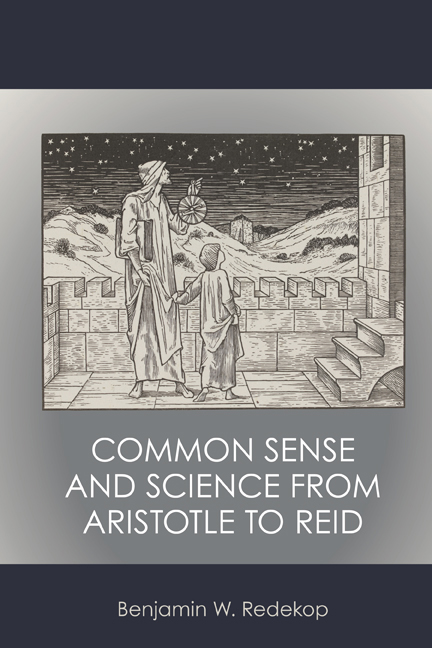Book contents
- Frontmatter
- Contents
- Acknowledgments
- Introduction
- 1 Common Sense and Scientific Thinking before Copernicus
- 2 The Challenge of Modern Science and Philosophy
- 3 Common Notions, Sens Commun: Herbert of Cherbury and Renè Descartes
- 4 Hobbes, Locke, and Innatist Responses to Skepticism and Materialism
- 5 Common Sense in Early Eighteenth-Century Thought
- 6 Common Sense and Moral Sense: Buffier, Hutcheson, and Butler
- 7 Common Sense and the Science of Man in Enlightenment Scotland: Turnbull and Kames
- 8 Common Sense, Science, and the Public Sphere: The Philosophy of Thomas Reid
- Epilogue
- Notes
- Index
1 - Common Sense and Scientific Thinking before Copernicus
Published online by Cambridge University Press: 07 November 2020
- Frontmatter
- Contents
- Acknowledgments
- Introduction
- 1 Common Sense and Scientific Thinking before Copernicus
- 2 The Challenge of Modern Science and Philosophy
- 3 Common Notions, Sens Commun: Herbert of Cherbury and Renè Descartes
- 4 Hobbes, Locke, and Innatist Responses to Skepticism and Materialism
- 5 Common Sense in Early Eighteenth-Century Thought
- 6 Common Sense and Moral Sense: Buffier, Hutcheson, and Butler
- 7 Common Sense and the Science of Man in Enlightenment Scotland: Turnbull and Kames
- 8 Common Sense, Science, and the Public Sphere: The Philosophy of Thomas Reid
- Epilogue
- Notes
- Index
Summary
Historians of philosophy suggest that philosophic reasoning arose in opposition to the common sense of the multitude. The earliest Greek philosophers—lovers of wisdom and seekers of the truth that lay behind appearances—often cast themselves as those who went against popular opinions and everyday prejudices. The mysterious teachings of Heraclitus (540–480 BCE) and Parmenides (515–450 BCE) seemed to contradict what was known to everyone. Heraclitus suggested that very few would ever understand the logos or underlying order of the world, while Parmenides advanced cryptic arguments to the effect that change was only apparent, not real. Democritus (460–370 BCE) posited a world made up of tiny atoms that was quite different from the world as we experience it. In doing so, Democritus made a distinction between what would come to be known as “primary” and “secondary” qualities. The former are qualities inherent in matter itself, while the latter are the qualities of things as they appear to us. Such teachings, historians of philosophy suggest, “set philosophers against common sense in a most dramatic way.”
Plato (428–348 BCE) did much, in his writings, to distance philosophers from the common people and to differentiate true scientific knowledge (epistêmê) from the misguided and murky opinion (doxa) of the rabble. At the same time, however, he advanced the notion that knowledge of absolute truths is in some sense innate, requiring dialectical reasoning to be brought to light. Experience of the sensible world is misleading and cannot by itself provide us with scientific knowledge; there is an intuitive dimension to knowing. A variation of this idea (albeit with much more faith in sense perception) would form one of the core concepts of the modern philosophy of common sense.
According to Plato, Socrates held that the body, with its inaccurate and misleading senses, hinders knowledge.3 Sight, touch, hearing, and taste provide only confused, relative measures of things, not their essence. True knowledge is abstract, universal, absolute, rational, and divorced from sense experience. The most that the multiplicity of sense experience can do is arouse perplexity and provoke thought, causing the mind to seek the essential unities that underlie the flux of experience.4 It is the task of the philosopher to lead men on this upward journey out of the realm of sense experience to higher levels of wisdom.
- Type
- Chapter
- Information
- Common Sense and Science from Aristotle to Reid , pp. 13 - 20Publisher: Anthem PressPrint publication year: 2020



